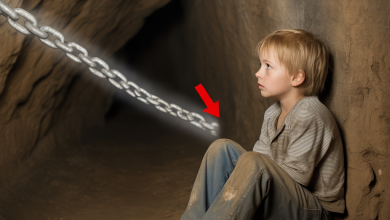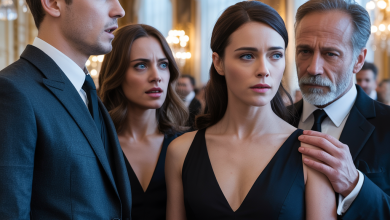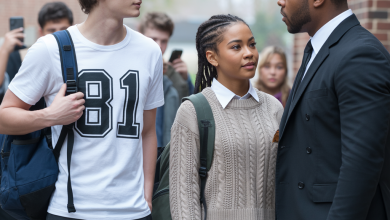The Billionaire’s Promise: How Three Abandoned Children Healed a Broken Man
Nathan Cole adjusted his Italian silk tie, his gaze fixed on the reflection in the expansive, floor-to-ceiling mirror. Perfect. As always. The man staring back was a carefully constructed masterpiece of success: forty-eight years old, impeccably dressed in a tailored suit that cost more than most people’s cars, a distinguished touch of gray at the temples, and a posture of unbreachable confidence. Everything was exactly as it should be, a life polished to a high sheen, reflecting nothing but power and control.
“Mr. Cole, the car is waiting,” a disembodied voice announced from the sleek intercom panel on the wall.
Nathan didn’t reply immediately. He picked up his leather briefcase from the edge of the king-sized bed and cast one last, sweeping look around the master suite of his Manhattan penthouse. The morning sunlight streamed through the panoramic windows, glinting off chrome and glass, illuminating the stark, minimalist lines of the space. The view of Central Park and the city skyline was a breathtaking, multi-million-dollar panorama, a daily reminder of the heights he had scaled. Everything he owned, from the art on the walls to the shoes in his closet, was a testament to his relentless ambition. His life was a collection of the finest things, curated and arranged with the same precision he applied to his business dealings.
“I’ll be down in a minute,” he finally responded, his voice cool and measured.
He walked through the living room, his footsteps echoing on the imported marble floor. The sound was a familiar companion. His life, he often thought, was like this penthouse: vast, beautiful, and filled with large, empty spaces where the echo of his own steps was the only constant presence. The silence was a luxury, but it was also a weight.
The phone on the console table rang, its shrill tone slicing through the quiet. It was Karen, his ever-efficient assistant, with the day’s immutable schedule. “Meeting at nine with the Japanese investors. Lunch with the mayor at noon. Conference call with Zurich at three.”
Nathan listened, his mind already drifting. Another day, another identical sequence of events. Business, contracts, millions of dollars changing hands like playing cards. And then, the inevitable return to the empty apartment. He would order in dinner from a restaurant with a three-month waiting list, work a little more at his massive mahogany desk, perhaps pour a single glass of twenty-five-year-old single malt whiskey while watching the financial news flicker across the screen. Then sleep, and repeat. It was a life of extraordinary success and profound monotony.
“And don’t forget the Children’s Health Foundation charity dinner at eight,” Karen concluded, her voice crisp and professional. “You’re seated at the head table.”
“Cancel the dinner,” he said suddenly, the words surprising even himself.
A beat of silence on the other end of the line. After ten years as his right hand, Karen knew when not to push, but the surprise in her silence was palpable. “But Mr. Cole, you confirmed your attendance weeks ago. The press will be there…”
“Tell them I’m sick. Tell them I’m traveling. Whatever you think is best.”
“As you wish, sir.”
Nathan hung up and stood motionless in the center of the room. What was he doing? The dinner was important for his public image, a necessary performance in the grand theater of philanthropy and power. His absence would be noticed. It would generate gossip. In his world, gossip could affect stock prices. Why cancel? The answer rose unbidden from a place deep within him: because he was tired. He was bone-weary of the fake smiles, the empty conversations, the endless parade of people who looked at him and saw only a walking bank vault, a powerful connection, a means to an end.
He walked over to the sleek, built-in bar and poured a shot of whiskey, the amber liquid catching the morning light. It was barely 8:00 a.m. He never drank this early. It was one of the many strict, unyielding rules he imposed upon himself, the very rules that had built his empire. He followed them with religious devotion, believing them to be the scaffolding of his success. The ice clinked sharply in the heavy crystal glass. Nathan stared at the drink, then set it down untouched on the granite countertop. No, not even this tempted him anymore. The usual escapes offered no refuge.
He retreated to his office, his sanctuary. There, surrounded by monitors displaying glowing graphs and cascading financial reports, he felt in control. The world could be chaotic, but here, it was reducible to numbers, to profit and loss, to predictable patterns. It was the only place that still made sense. He opened a filing cabinet to retrieve some documents for the upcoming meeting, and that’s when his meticulously ordered world began to unravel.
An old, forgotten manila envelope, balanced precariously on top of a folder, slipped and fell, scattering its contents across the polished floor. Nathan knelt to pick up the papers and froze. An old photograph lay face up, a ghost from a life he had long since buried.
It was Dylan, his son, at six years old, beaming with a wide, innocent smile, two front teeth conspicuously missing. He was proudly holding a small, golden baseball trophy. Nathan stood beside him in the photo, a younger, happier version of himself, his arm draped over the boy’s small shoulders. They were both squinting, happy under the warm sun of some forgotten Sunday afternoon.
His fingers trembled as he picked up the image, as if it were something fragile and precious, which, he realized with a sudden, painful clarity, it was. Nathan pressed the photograph against his chest for a long moment, closing his eyes against the sudden, overwhelming surge of memory. He remembered that day. Dylan’s first baseball game. The boy had hit the ball with a surprising crack of the bat and had run as fast as his short, clumsy legs would carry him. It wasn’t a home run; he’d barely made it to first base. But the look on his face when he turned to the stands, his eyes searching for his dad’s approval—that was a victory more triumphant than any World Series.
Nathan swallowed hard against the lump forming in his throat. How many games had he missed after that one? How many school plays, birthdays, scraped knees, and small triumphs had he sacrificed at the altar of his ambition? It’s just temporary, honey, he would tell Lauren, his wife, whenever she pleaded with him to come home earlier. Once we’re financially secure, I’ll have more time for you and Dylan. But that time never came. “Enough” was a horizon that perpetually receded. There was always another acquisition to be made, another expansion to oversee, another market to conquer.
He carefully put the photo back in the envelope and placed it in a desk drawer, out of sight but not out of mind. His eyes landed on the phone. How many years had it been since he had spoken to Dylan? Five? Six? His son must be over twenty now, a young man who had navigated adolescence and entered adulthood without a father to guide him. Nathan picked up the receiver, his thumb hovering over the numbers he still knew by heart. He stared at it for a long, agonizing moment, then put it back down. What could he possibly say after all this time? Sorry I wasn’t there? Sorry I chose spreadsheets over you? They were just empty words now, a currency he had devalued through years of neglect.
The intercom rang again, a jarring intrusion. “Mr. Cole, the driver is worried about the time for the meeting. The investors are already at the office.”
Nathan glanced at the clock. He was late. The Japanese investors were notoriously punctual; they loathed delays. The deal was worth billions. “I’m on my way down,” he answered, his voice a hollow automaton’s.
He grabbed the briefcase, adjusted his tie one more time, and walked to the door. He paused with his hand on the polished steel knob, looking back at the luxurious, silent apartment. For a split second, a strange and treasonous thought pierced his consciousness: All this success, all the money, the power, the respect… has it been worth it?
The thought vanished as quickly as it came, pushed down by a lifetime of conditioning. He was Nathan Cole, one of the richest and most powerful men in the country. Of course it had been worth it. It had to be.
He shut the door firmly behind him and headed to the elevator. In the mirrored walls of the elevator car, he adjusted his perfect tie once again, squared his shoulders, and composed his face into a mask of confident authority. What else was there to do? This was his life now. But as the elevator descended silently through the heart of the building, the ghost of that photograph and the hollow feeling in his chest remained, an unanswered question, a pain with no name.
The meeting with the Japanese investors was a catastrophe.
For the first time in his illustrious career, Nathan Cole couldn't focus. The image of Dylan’s gap-toothed smile kept invading his thoughts, superimposing itself over the complex financial projections on the screen. He stumbled during the presentation, mixed up crucial numbers, and at one point, called the venerable head of the delegation, Mr. Tanaka, by the wrong name. Karen, seated across the polished boardroom table, watched him with a look of growing alarm. Nathan Cole never made mistakes. Nathan Cole never lost focus. Something was profoundly wrong.
“I apologize. I’m… not feeling well today,” he finally said, interrupting his own rambling explanation about growth projections for the next quarter.
Mr. Tanaka, a man whose politeness was as sharp as a sword, nodded coolly. “Perhaps it is better if we reschedule for another day, Mr. Cole.” It wasn’t a suggestion; it was a polite but unequivocal rebuke. Nathan knew he had just jeopardized a multi-billion-dollar deal, an error that would have been unthinkable just twenty-four hours ago.
“Certainly. Karen will be in touch to arrange a new date.” Formal handshakes, forced smiles. The meeting room emptied with a quiet, efficient haste.
“What’s going on, Nathan?” Karen asked the moment they were alone, forgoing his usual formal title. “Are you sick? Should I call a doctor?”
Nathan rubbed his temples, a deep, throbbing ache beginning to bloom behind his eyes. “No. I just need some air. Cancel my appointments for the rest of the day.”
“All of them? Even the Zurich conference call?”
“All of them,” he confirmed, grabbing his coat. In ten years, she had never seen him cancel an entire day of commitments.
“I’m walking home,” he announced, heading for the door.
“It’s raining,” Karen warned, gesturing toward the windows where gray sheets of water were lashing against the glass. “And it’s nearly twenty blocks.”
Nathan didn’t reply. The elevator door closed behind him.
Outside, the rain fell in thin, steady cords, quickly soaking through his expensive Italian suit. He didn’t mind. The penetrating cold and the dampness were almost a welcome sensation—something real, something he could feel beyond the numb emptiness that had taken hold of him. He walked aimlessly, letting his feet guide him through the bustling streets of Midtown. But instead of heading toward his pristine penthouse, he found himself walking in the opposite direction, toward a part of the city he rarely visited.
The shiny steel and glass skyscrapers gradually gave way to older, less imposing brick and stone constructions. The people on the sidewalks no longer wore expensive suits and carried designer briefcases, but simple, everyday clothes. The rain eased into a light, persistent drizzle. Nathan stopped on a corner, suddenly disoriented, realizing he was in a middle-class residential neighborhood. There were small, family-owned shops: a bakery with a fogged-up window, a laundromat, a convenience store. These were ordinary places for ordinary people.
His stomach growled, a sharp, unfamiliar pang. He hadn’t eaten all day. He spotted a little diner across the street, its neon sign glowing softly in the gray afternoon. He crossed and went inside.
The interior was simple but clean. The air was filled with the comforting aroma of fresh coffee and something savory cooking on a griddle. A middle-aged woman with a warm, tired smile stood behind the counter. “What’ll it be, hon?” she asked as he walked in.
Nathan hesitated, unaccustomed to such casual informality. His usual restaurants had Michelin stars, where a maître d‘ would call him Mr. Cole and a sommelier would know his wine preferences by heart. “A coffee,” he said, “and a… ham sandwich, please.”
“Comin’ right up. Sit wherever you like.”
He chose a booth in the back and looked out the window. Across the street was a small, green park. Even with the drizzle, a few children were playing on the swings while their mothers and babysitters chatted on nearby benches. The waitress brought his order. The coffee was piping hot and strong, served in a thick, ceramic mug. The sandwich was simple: white bread, ham, cheese, and a leaf of lettuce. No artisan bread, no imported charcuterie. Nathan took a bite and was surprised. It was good. Really good. He ate slowly, watching ordinary life unfold on the other side of the glass. Ordinary people with ordinary problems, living ordinary lives. It was a world he had once known, a world he had purposefully left behind.
After finishing, Nathan left a twenty-dollar bill on the table, more than three times the cost of the meal, and walked out into the cool, clean air. The rain had stopped completely. He decided to walk through the small park, still unsure of where he was going. He passed a playground with three children and two mothers, then a small pond where a family of ducks swam peacefully.
That’s when he saw her.
At the far end of the park, sitting on a bench still glistening with rain, was a little girl. She looked exhausted and dirty, with tangled brown hair falling over her pale face. And in her arms, she cradled two babies, both wrapped in old, worn blankets. Nathan stopped, an immediate sense of wrongness gripping him. The girl seemed far too young to be caring for two infants. The children looked too small, too fragile to be out in the damp, chilly weather. Where were their parents? He glanced around, but no one was paying any attention to the little girl and the babies. They were invisible.
Hesitantly, Nathan approached. “Hello,” he said, his voice soft, keeping a respectful distance. “Are you all right? Do you need help?”
The girl looked up. Her eyes were an intense, startling blue, but they were red-rimmed and swollen from crying. When she spoke, her voice was a thin, trembling whisper. “Mister… can you help us?”
Nathan could hear the genuine desperation in her voice. Up close, the situation looked even more dire. The children’s clothes were dirty and damp. The babies seemed to be asleep, but it was a still, unnervingly quiet sleep. Nathan felt a tightness in his chest.
“Yes, I can help,” he said. “Where are your parents?”
The girl’s lips pressed into a tight, white line, as if she were fighting back a fresh wave of tears. “My mom… she…” she began, but was interrupted when one of the babies let out a faint, pained moan. Her young face crumpled into a mask of pure despair.
And then, it happened.
With a sudden, desperate movement, the girl stood and held out both babies toward Nathan, her blue eyes now overflowing with tears that cut clean streaks through the grime on her cheeks.
“Please… keep them,” she said, her voice cracking into a heart-wrenching sob. “I can’t stand watching my little brothers starve anymore.”
It was as if something inside Nathan, something that had been hard, cold, and calcified for years, suddenly shattered. He felt an unbearable lump form in his throat, and to his own astonishment, a single, hot tear escaped his eye and rolled down his cheek. For the first time in how many years—five, ten, maybe more?—Nathan Cole was crying.
It wasn't a dramatic, heaving sob. It was just that single tear, carrying with it the immense weight of his loneliness, his regret, and the vast, echoing emptiness of the life he had so painstakingly built.
“I can’t anymore,” the girl continued, her voice choked with grief. “I tried, I swear I tried to take care of them, but I have no more food, and Luke has a fever, and Ben… Ben won’t stop crying.”
Nathan knelt to her level, his expensive, rain-soaked suit forgotten. “What’s your name?”
“Sadie,” she mumbled, still holding the babies out to him as if they were a fragile, painful offering.
“Sadie. I’m Nathan. I’ll help you and your brothers. Okay?” The words just came out, unbidden, unplanned.
The girl’s eyes widened, a flicker of disbelief in their depths. “Really?”
“Really.” He had no idea what he was doing. Taking responsibility for children? He, who had so spectacularly failed as a father, who had spent years constructing impenetrable walls to keep feelings out. It was madness. But something stronger than reason, stronger than a lifetime of self-imposed rules, was moving him now.
“Do you have anywhere to go? Anyone you can stay with?”
Sadie shook her head, her lower lip trembling.
“Then come with me,” he said, the decision solidifying in his heart even as his mind screamed in protest. “I’ll take you somewhere warm, and we’ll get food and dry clothes.”
Without thinking of the consequences, without considering what this would mean for his carefully orchestrated life, Nathan Cole, the billionaire who had just fumbled a multi-billion-dollar business meeting, opened his arms. Sadie hesitated for only a second before placing one of the babies into them. The child was alarmingly light, his small body feverish even through the damp blankets.
“This is Luke,” she said, still clutching the other baby to her chest. “And this is Ben.”
“Hi, Luke,” Nathan murmured, awkwardly positioning the baby in his arms, the foreignness of the act a stark reminder of his unpreparedness. “Let’s get out of here, okay?” He stood and, with a wave of his hand, flagged down a taxi. The driver threw a suspicious look at the unlikely quartet—a man in a soaked designer suit, a dirty little girl, and two infants wrapped in faded blankets.
“Where to, pal?”
Nathan gave the address of his penthouse apartment.
As the taxi pulled away from the curb, leaving behind the park and its ordinary visitors, Nathan knew that his own ordinary, predictable life was over. In the back seat, Sadie kept her eyes on him, a mixture of fragile hope and deep-seated distrust in her tired gaze.
“It’s going to be okay,” he said, not knowing if it was a promise he could keep, but determined, for the first time in a very long time, to try.




